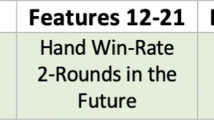Abstract
This paper focuses on the development of a competitive computer player for the one versus one Texas Hold’em poker using evolutionary algorithms (EA). A Texas Hold’em game engine is first constructed where an efficient odds calculator is programmed to allow for the abstraction of a player’s cards, which yield important but complex information. Effort is directed to realize an optimal player that will play close to the Nash equilibrium (NE) by proposing a new fitness criterion. Preliminary studies on a simplified version of poker highlighted the intransitivity nature of poker. The evolved player displays strategies that are logical but reveals insights that are hard to comprehend e.g., bluffing. The player is then benchmarked against Poki and PSOpti, which is the best heads-up Texas Hold’em artificial intelligence to date and plays closest to the optimal Nash equilibrium. Despite the much constrained chromosomal strategy representation, simulated results verified that evolutionary algorithms are effective in creating strategies that are comparable to Poki and PSOpti in the absence of expert knowledge.
Similar content being viewed by others
Explore related subjects
Discover the latest articles and news from researchers in related subjects, suggested using machine learning.References
Using artificial neural networks to model opponents in Texas Hold’em. Machine Learning in Games Undergraduate Research Course, CMPUT 499, Computer Poker Research Group, University of Alberta, 1999
Korb K B, Nicholson A E, Jitnah N. Bayesian poker. In: Proceedings of the Uncertainty in Artificial Intelligence (UAI), 1999, 343–350
Billings D. Computer Poker. M. Sc. research essay, Computer Poker Research Group. Alberta: University of Alberta, 1995
Cosmic Log, MSNBC. Human Beat Poker Bot · · · Barely, 2007, http://cosmiclog.msnbc.msn.com/archive/2007/07/25/289607.aspx
Holland J H. Genetic Algorithms, 2005, http://www.econ.iastate.edu/tesfatsi/holland.GAIntro.htm
Nash J. Equilibrium points in n-person games. In: Proceedings of the National Academy of Sciences of the United States of America, 1950, 36(1): 48–49
Billings D, Davidson A, Schaeffer J, Szafron D. The challenge of poker. Artificial Intelligence Journal, 2002, 134(1–2): 201–240
Billings D, Papp D, Schaeffer J, Szafron D. Opponent modeling in poker. In: Proceedings of the fifteen AAAI conference, 1998, 493–499
Billings D, Papp D, Schaeffer J, Szafron D. Poker as a testbed for machine intelligence research. In: Mercer R, Neufeld E, eds. Advances in Artificial Intelligence. Springer-Verlag, 1998, 1–15
Papp D. Dealing with imperfect information in poker. M.Sc. thesis. Alberta: University of Alberta, 1998
Billings D, Pena L, Schaeffer J, Szafron D. Using probabilistic knowledge and simulation to play poker. In: Proceedings of the sixteenth AAAI conference, 1999, 697–703
Davidson A, Billings D, Schaeffer J, Szafron D. Improved opponent modeling in poker. In: Proceedings of the 2000 International Conference on Artificial Intelligence (ICAI’2000), 2000, 1467–1473
Express News, University of Alberta. U of A researchers win computer poker title, 2006, http://www.expressnews.ualberta.ca/article.cfm?id=7789
Billings D, Burch N, Davidson A, Holte R, Schaeffer J, Scauenberg T, Szafron D. Approximating game-theoretic optimal strategies for full-scale Poker. In: Proceedings of the Eighteenth International Joint Conference on Artificial Intelligence (IJCAI-03), 2003, 661–668
Barone L, While L. An adaptive learning model for simplified Poker using evolutionary algorithms. In: Proceedings of the Congress on Evolutionary Computation (GECCO-1999), 1999, 1: 153–160
Barone L, While L. Adaptive learning for poker. In: Proceedings of the Genetic and Evolutionary Computation Conference 2000 (GECCO-2000), 2000, 566–573
Oliehoek F, Vlassis N, De Jong E. Coevolutionary Nash in poker games. In: Proceedings of the seventeenth Belgian-Dutch Conference on Artificial Intelligence (BNAIC-2005), 2005, 188–193
The Early Show, CBS News. Poker’s Popularity Surging, 2004, http://www.cbsnews.com/stories/2004/12/25/earlyshow/living/main663053.shtml
Kuhn H W. Extensive games and the problem of information. In: Proceedings of Contributions to the Theory of Games, Annals of Mathematics Studies, 1953, 2(28): 193–216
Author information
Authors and Affiliations
Corresponding author
Rights and permissions
About this article
Cite this article
Quek, H., Woo, C., Tan, K. et al. Evolving Nash-optimal poker strategies using evolutionary computation. Front. Comput. Sci. China 3, 73–91 (2009). https://doi.org/10.1007/s11704-009-0007-5
Received:
Accepted:
Published:
Issue Date:
DOI: https://doi.org/10.1007/s11704-009-0007-5




